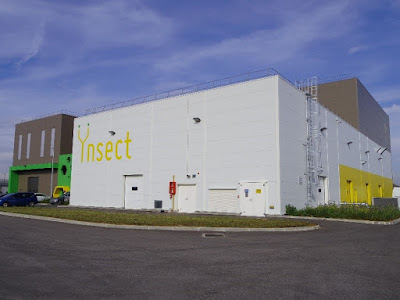FARMYNG project – The first commercial insect biorefinery for alternative proteins production
Type of post: PROJECT PROFILE.
In late 2014, the Blog issued a post (only in
Spanish) about Ÿnsect (a French company that farms insects to make
high-quality, premium natural ingredients for aquaculture and pet nutrition)
and its biorefinery model. In that time, Ÿnsect was dealing with the building
of its first pilot facility. Now, with the boost of a BBI JU flagship project, this
company will stablish the first commercial biorefinery that produces
alternative proteins from insects for animal nutrition on an industrial scale. We
are going to find out more about Ÿnsect and the FARMYNG project whose official
launch took place last 11th June.
FARMYNG key data
Title
|
FlAgship
demonstration of industrial scale production of nutrient Resources from
Mealworms to develop a bioeconomY New Generation (FARMYNG).
|
Aim
|
FARMYNG
aims to establish the largest global fully-automated flagship industrial
plant to produce premium proteins from insects (Tenebrio Molitor), showcasing
a successful example to customers, investors and suppliers, in Amiens (France).
The FARMYNG
flagship plant will be able to produce more than 1,500 tons of proteins per
month, a production rate that has never been achieved by any other
insect-protein production plant in the world.
|
Programmes
|
- H2020-EU.2.1.4.
- INDUSTRIAL LEADERSHIP - Leadership in enabling and industrial technologies
– Biotechnology.
- H2020-EU.3.2.6.
- Bio-based Industries Joint Technology Initiative (BBI-JTI).
|
Topic
|
BBI.2018.SO3.F2
- Large-scale production of proteins for food and feed applications from
alternative, sustainable sources.
|
Call for
proposals
|
H2020-BBI-JTI-2018.
|
Funding
Scheme
|
BBI-IA-FLAG
- Bio-based Industries Innovation action – Flagship.
|
Total budget
/ EC contribution
|
46,934,849.10
€ / 19,630,411.18 €
|
Start
date / End date
|
1 June
2019 – 30 June 2022
|
Coordinator
|
- YNSECT
(France)
|
Partners
|
- AJINOMOTO ANIMAL NUTRITION EUROPE (France)
- ASSOCIATION
INDUSTRIES ET AGRO-RESSOURCES (France)
- CENTRE
WALLON DE RECHERCHES AGRONOMIQUES (Belgium)
- CHAMTOR (France)
- CLEXTRAL (France)
- CLUSTER
INDUSTRIELLE BIOTECHNOLOGIE 2021 E.V. (Germany)
- COMMISSARIAT
A L ENERGIE ATOMIQUE ET AUX ENERGIES ALTERNATIVES (France)
- COMPO
FRANCE (France)
- EUROFINS
ANALYTICS FRANCE SAS (France)
- MG 2
MIX (France)
- MIGUEL
TORRES SA (Spain)
- PNO
CONSULTANTS (France)
- QUANTIS
(Switzerland)
- SKRETTING
AQUACULTURE RESEARCH CENTRE AS (Norway)
- STAR
FOOD HOLLAND BV (Netherlands)
- STOWARZYSZENIE
ZACHODNIOPOMORSKI KLASTER CHEMICZNY ZIELONA CHEMIA (Poland)
- TGC
EXTRUSION (France)
- ULMA
MANUTENCION S. COOP. (Spain)
- VIRBAC
NUTRITION (France)
|
Ÿnsect summarised history
2011
|
Ÿnsect is
established by 4 founders with complementary skills and entrepreneurial
experience.
|
2012
|
Ÿnsect joins
Agoranov (a French incubator) and coordinates one of the largest R&D
programs on insect-based products (DESIRABLE).
|
2013
|
Ÿnsect
launches its lab-scale production.
|
2014
|
Ÿnsect is
joined by eminent partners to develop its strategy and raises 1.8 M€ with Emertec
and Demeter. It is the French Cleantech company of the year and opens a new
facility at Genopole biocluster.
|
2015
|
Ÿnsect invests
10 M€ in the construction of Ÿnsite, a pilot farm-hill in Dole (France).
|
2016
|
Ÿnsect
produces several hundreds of tons of finished products.
|
2017
|
Ÿnsect accelerates
its development and begins the building of its first farm-hill.
|
2018
|
Ÿnsect announces
the installation of Ÿnfarm#1 in the vincinity of Amiens.
|
2019
|
Ÿnsect
raises 125 M$, the largest-ever ag-tech funding deal outside of the United
States.
|
Figure 1. Ÿnsite, a demonstration facility
designed to produce insects at large scale (taken from the company website)
Ÿnsect process
Ÿnsect process addresses plenty of disciplines
like animal husbandry, microbiology, plant nutrition, animal nutrition,
robotics, big data, biochemistry and enzymology. Its ŸnFarm platform deals with
high tech farming based on robotics, embedded sensors and big data to produce
very large quantities of insects at a very high quality. Also, the process works
with mild processing technologies to recover all insect compounds, in a zero
waste scheme. Ÿnsect uses agro-byproducts and food leftovers as insect feed in
a circular economy scheme, to prevent incineration or other low-grade
valorization of these biomass materials.
Figura 2. Ÿnsect process (taken from the
company website)
Insect production is very economical in terms
of natural resources and delivers products that are reducing impacts on the
environment by their substitution potential. Insects can build complex,
efficient structures to support their populations. Ants, for example, use
tunnel networks to access stacked, vertical alcoves with eggs, larvae, and
adults. These tunnels optimize air flow to ventilate the entire ant hill
structure. Inspired by this insect ingenuity, Ÿnsect has built vertical farms
of Molitor (mealworm beetles) and it call them “Farm-hills”, in
reference to their inspired-by-nature origin (according to the principle of
biomimicry, drawing inspiration from nature).
Juvenile insect larvae are fed and grow under
optimal conditions for several weeks 95% are steamed, then processed into
proteins and oils, without using any chemical agents. The remaining 5% become
adults and reproduce to renew the juvenile population.
Ÿnsect products
ŸnOilTM: It is a light oil rich in polyunsaturated fatty
acids, extracted from Molitor larvae via automated mechanical processes.
It is a natural source of daily nutrition for farmed fish and crustaceans and
pets.
ŸnMealTM: It is a highly digestible, natural source of
premium protein, with more than 70% protein concentrate. Ÿnsect turns Molitor
larvae into powder form perfectly suited for farmed fish and crustacean nutrition
and pet diets.
ŸnFrassTM: Ÿnsect offers an environmentally friendly fertilizer alternative. Insects
are an essential part of natural soil biodiversity. ŸnFrass is made of Molitor
larvae castings, is rich in organic matter and contains essential nutrients for
plant growth and health.






